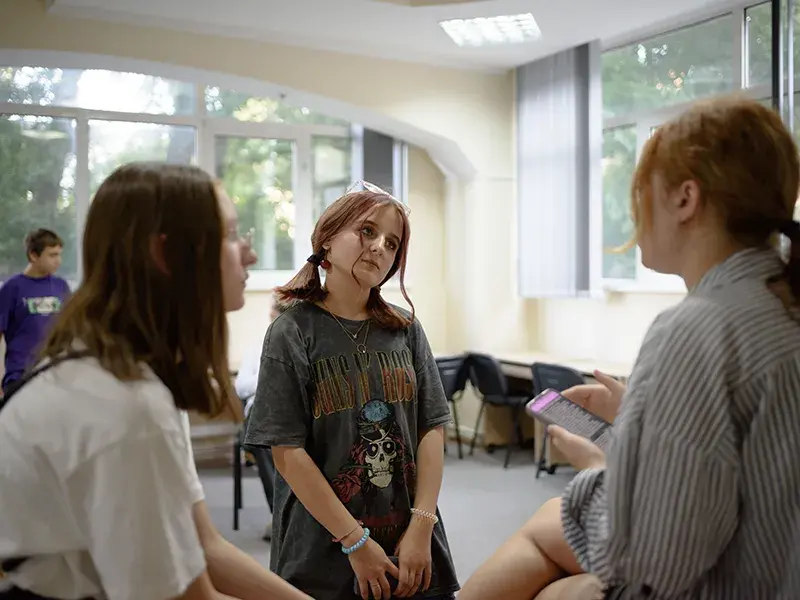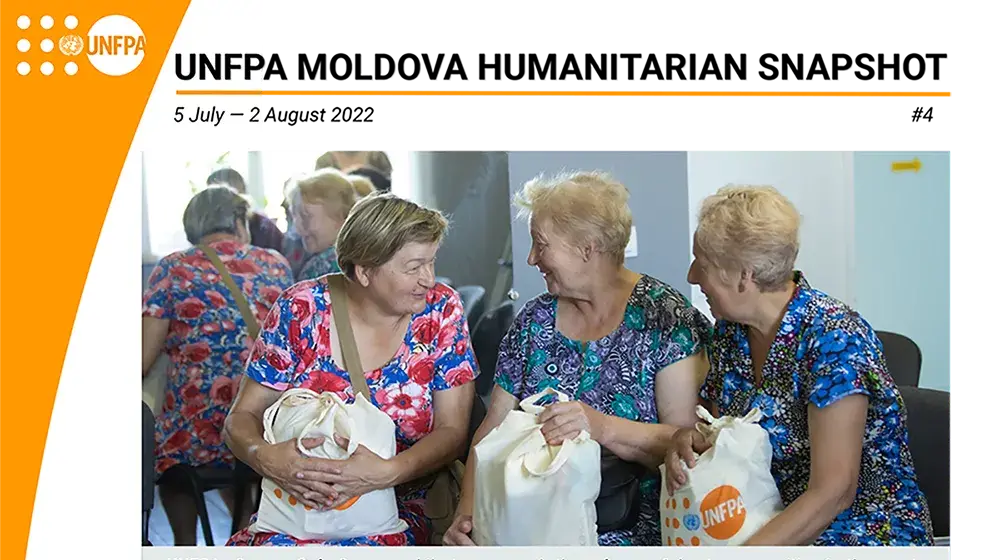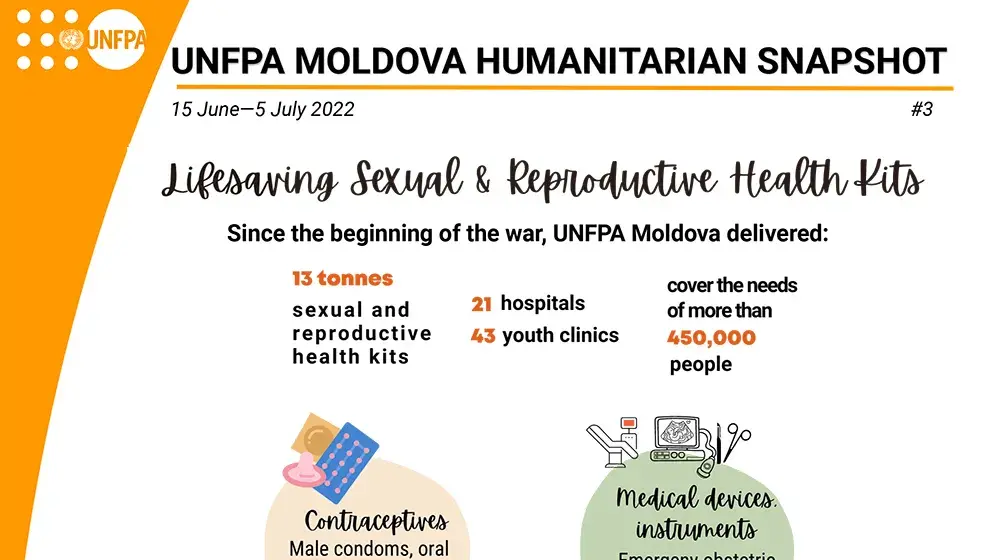Photos
Life on Pause - Story of Alya, student

Alvina is 14 years old. She hails from a small provincial town in the Donetsk region of Ukraine, specifically from Novgrodovka. For her, the war started when she was five years old, in 2014. During this time, she got accustomed to the sounds of flying shells, artillery fire, in other words, the sounds of war: "I did not immediately understand that the sounds of rockets and explosions are not normal. I used to think that if it's like that here, it's probably like that everywhere."
Alvina and her family do not live in Chisinau itself but in the suburbs, in Floreni, which is only 20 minutes away by public transport from the capital. Despite Chisinau not being a large city, for Alya, it seems huge. She studies at a Ukrainian school through an online learning system, so she has no face-to-face communication with her classmates, but the lack of communication with her peers is compensated by the UNFPA-partner Millennium center. Just like Oleg, she spends almost all her extracurricular time there:
"Millennium is my life, especially in the summer. We practically lived there. We'd arrive around 10-11 am, leave at 8 pm, and be home by 9. We'd just sleep at home so we could return in the morning. I don't know what I would do without Millennium. I would be sitting in my room, doing my homework, and there would be no life. All my friends are there, all my companions."
"War forces you to grow up faster than you should. Without the war, I would be a little girl, living in my town, knowing and understanding nothing. Even though I'm 14, I've matured faster. I've learned to be alone, to do without friends. I've learned to cope with adversity—I've experienced it all, and I've become an adult."
A few years ago, Alya found a video of a girl who was about to enter the Faculty of Economics. She shared her thoughts about it in her blog—she talked about her enrollment and how she was studying. Now that girl is in her third year, and it has inspired Alya to choose her future path. She wants to go to a university to study economics, but only in Ukraine: "I think it will be in demand. I would like to become an economist in a reputable company. I know that I have the aptitude for it. After the war, I would like to contribute to rebuilding the economy."
Read more stories within Life on Pause series here: https://moldova.unfpa.org/en/life-pause-story-human-resilience-and-adaptation

Alvina is 14 years old. She hails from a small provincial town in the Donetsk region of Ukraine, specifically from Novgrodovka. For her, the war started when she was five years old, in 2014. During this time, she got accustomed to the sounds of flying shells, artillery fire, in other words, the sounds of war: "I did not immediately understand that the sounds of rockets and explosions are not normal. I used to think that if it's like that here, it's probably like that everywhere."
Alvina and her family do not live in Chisinau itself but in the suburbs, in Floreni, which is only 20 minutes away by public transport from the capital. Despite Chisinau not being a large city, for Alya, it seems huge. She studies at a Ukrainian school through an online learning system, so she has no face-to-face communication with her classmates, but the lack of communication with her peers is compensated by the UNFPA-partner Millennium center. Just like Oleg, she spends almost all her extracurricular time there:
"Millennium is my life, especially in the summer. We practically lived there. We'd arrive around 10-11 am, leave at 8 pm, and be home by 9. We'd just sleep at home so we could return in the morning. I don't know what I would do without Millennium. I would be sitting in my room, doing my homework, and there would be no life. All my friends are there, all my companions."
"War forces you to grow up faster than you should. Without the war, I would be a little girl, living in my town, knowing and understanding nothing. Even though I'm 14, I've matured faster. I've learned to be alone, to do without friends. I've learned to cope with adversity—I've experienced it all, and I've become an adult."
A few years ago, Alya found a video of a girl who was about to enter the Faculty of Economics. She shared her thoughts about it in her blog—she talked about her enrollment and how she was studying. Now that girl is in her third year, and it has inspired Alya to choose her future path. She wants to go to a university to study economics, but only in Ukraine: "I think it will be in demand. I would like to become an economist in a reputable company. I know that I have the aptitude for it. After the war, I would like to contribute to rebuilding the economy."
Read more stories within Life on Pause series here: https://moldova.unfpa.org/en/life-pause-story-human-resilience-and-adaptation

Alvina is 14 years old. She hails from a small provincial town in the Donetsk region of Ukraine, specifically from Novgrodovka. For her, the war started when she was five years old, in 2014. During this time, she got accustomed to the sounds of flying shells, artillery fire, in other words, the sounds of war: "I did not immediately understand that the sounds of rockets and explosions are not normal. I used to think that if it's like that here, it's probably like that everywhere."
Alvina and her family do not live in Chisinau itself but in the suburbs, in Floreni, which is only 20 minutes away by public transport from the capital. Despite Chisinau not being a large city, for Alya, it seems huge. She studies at a Ukrainian school through an online learning system, so she has no face-to-face communication with her classmates, but the lack of communication with her peers is compensated by the UNFPA-partner Millennium center. Just like Oleg, she spends almost all her extracurricular time there:
"Millennium is my life, especially in the summer. We practically lived there. We'd arrive around 10-11 am, leave at 8 pm, and be home by 9. We'd just sleep at home so we could return in the morning. I don't know what I would do without Millennium. I would be sitting in my room, doing my homework, and there would be no life. All my friends are there, all my companions."
"War forces you to grow up faster than you should. Without the war, I would be a little girl, living in my town, knowing and understanding nothing. Even though I'm 14, I've matured faster. I've learned to be alone, to do without friends. I've learned to cope with adversity—I've experienced it all, and I've become an adult."
A few years ago, Alya found a video of a girl who was about to enter the Faculty of Economics. She shared her thoughts about it in her blog—she talked about her enrollment and how she was studying. Now that girl is in her third year, and it has inspired Alya to choose her future path. She wants to go to a university to study economics, but only in Ukraine: "I think it will be in demand. I would like to become an economist in a reputable company. I know that I have the aptitude for it. After the war, I would like to contribute to rebuilding the economy."
Read more stories within Life on Pause series here: https://moldova.unfpa.org/en/life-pause-story-human-resilience-and-adaptation

Alvina is 14 years old. She hails from a small provincial town in the Donetsk region of Ukraine, specifically from Novgrodovka. For her, the war started when she was five years old, in 2014. During this time, she got accustomed to the sounds of flying shells, artillery fire, in other words, the sounds of war: "I did not immediately understand that the sounds of rockets and explosions are not normal. I used to think that if it's like that here, it's probably like that everywhere."
Alvina and her family do not live in Chisinau itself but in the suburbs, in Floreni, which is only 20 minutes away by public transport from the capital. Despite Chisinau not being a large city, for Alya, it seems huge. She studies at a Ukrainian school through an online learning system, so she has no face-to-face communication with her classmates, but the lack of communication with her peers is compensated by the UNFPA-partner Millennium center. Just like Oleg, she spends almost all her extracurricular time there:
"Millennium is my life, especially in the summer. We practically lived there. We'd arrive around 10-11 am, leave at 8 pm, and be home by 9. We'd just sleep at home so we could return in the morning. I don't know what I would do without Millennium. I would be sitting in my room, doing my homework, and there would be no life. All my friends are there, all my companions."
"War forces you to grow up faster than you should. Without the war, I would be a little girl, living in my town, knowing and understanding nothing. Even though I'm 14, I've matured faster. I've learned to be alone, to do without friends. I've learned to cope with adversity—I've experienced it all, and I've become an adult."
A few years ago, Alya found a video of a girl who was about to enter the Faculty of Economics. She shared her thoughts about it in her blog—she talked about her enrollment and how she was studying. Now that girl is in her third year, and it has inspired Alya to choose her future path. She wants to go to a university to study economics, but only in Ukraine: "I think it will be in demand. I would like to become an economist in a reputable company. I know that I have the aptitude for it. After the war, I would like to contribute to rebuilding the economy."
Read more stories within Life on Pause series here: https://moldova.unfpa.org/en/life-pause-story-human-resilience-and-adaptation

Alvina is 14 years old. She hails from a small provincial town in the Donetsk region of Ukraine, specifically from Novgrodovka. For her, the war started when she was five years old, in 2014. During this time, she got accustomed to the sounds of flying shells, artillery fire, in other words, the sounds of war: "I did not immediately understand that the sounds of rockets and explosions are not normal. I used to think that if it's like that here, it's probably like that everywhere."
Alvina and her family do not live in Chisinau itself but in the suburbs, in Floreni, which is only 20 minutes away by public transport from the capital. Despite Chisinau not being a large city, for Alya, it seems huge. She studies at a Ukrainian school through an online learning system, so she has no face-to-face communication with her classmates, but the lack of communication with her peers is compensated by the UNFPA-partner Millennium center. Just like Oleg, she spends almost all her extracurricular time there:
"Millennium is my life, especially in the summer. We practically lived there. We'd arrive around 10-11 am, leave at 8 pm, and be home by 9. We'd just sleep at home so we could return in the morning. I don't know what I would do without Millennium. I would be sitting in my room, doing my homework, and there would be no life. All my friends are there, all my companions."
"War forces you to grow up faster than you should. Without the war, I would be a little girl, living in my town, knowing and understanding nothing. Even though I'm 14, I've matured faster. I've learned to be alone, to do without friends. I've learned to cope with adversity—I've experienced it all, and I've become an adult."
A few years ago, Alya found a video of a girl who was about to enter the Faculty of Economics. She shared her thoughts about it in her blog—she talked about her enrollment and how she was studying. Now that girl is in her third year, and it has inspired Alya to choose her future path. She wants to go to a university to study economics, but only in Ukraine: "I think it will be in demand. I would like to become an economist in a reputable company. I know that I have the aptitude for it. After the war, I would like to contribute to rebuilding the economy."
Read more stories within Life on Pause series here: https://moldova.unfpa.org/en/life-pause-story-human-resilience-and-adaptation

Alvina is 14 years old. She hails from a small provincial town in the Donetsk region of Ukraine, specifically from Novgrodovka. For her, the war started when she was five years old, in 2014. During this time, she got accustomed to the sounds of flying shells, artillery fire, in other words, the sounds of war: "I did not immediately understand that the sounds of rockets and explosions are not normal. I used to think that if it's like that here, it's probably like that everywhere."
Alvina and her family do not live in Chisinau itself but in the suburbs, in Floreni, which is only 20 minutes away by public transport from the capital. Despite Chisinau not being a large city, for Alya, it seems huge. She studies at a Ukrainian school through an online learning system, so she has no face-to-face communication with her classmates, but the lack of communication with her peers is compensated by the UNFPA-partner Millennium center. Just like Oleg, she spends almost all her extracurricular time there:
"Millennium is my life, especially in the summer. We practically lived there. We'd arrive around 10-11 am, leave at 8 pm, and be home by 9. We'd just sleep at home so we could return in the morning. I don't know what I would do without Millennium. I would be sitting in my room, doing my homework, and there would be no life. All my friends are there, all my companions."
"War forces you to grow up faster than you should. Without the war, I would be a little girl, living in my town, knowing and understanding nothing. Even though I'm 14, I've matured faster. I've learned to be alone, to do without friends. I've learned to cope with adversity—I've experienced it all, and I've become an adult."
A few years ago, Alya found a video of a girl who was about to enter the Faculty of Economics. She shared her thoughts about it in her blog—she talked about her enrollment and how she was studying. Now that girl is in her third year, and it has inspired Alya to choose her future path. She wants to go to a university to study economics, but only in Ukraine: "I think it will be in demand. I would like to become an economist in a reputable company. I know that I have the aptitude for it. After the war, I would like to contribute to rebuilding the economy."
Read more stories within Life on Pause series here: https://moldova.unfpa.org/en/life-pause-story-human-resilience-and-adaptation




